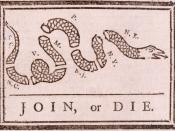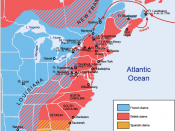The American Revolution: Causes
The American Revolution was not an upheaval on the grand scale. In terms of monetary costs and casualties, previous wars had exceeded the War of Independence by a great margin. Its importance however is its effect upon the rest of the world. This collection of colonies founded by the influential, the oppressed, the rich, the poor, the intolerant and the open-minded, would become the greatest nation on earth and after the cold war the only surviving superpower. The secession of the United States from the British Empire marked a turning point in the European dominated imperial world. Inspired by the boldness and ferocity of their patriotic fervor, revolutions would spring up in France followed by, in rapid succession, those colonies held by the Portuguese and Spanish in Central and South America. This is why, even though the immediate effects of the revolution were relatively small, it is of such great lasting importance.
The causes of the American Revolution lie in the mercantile practices of Western Europe followed after Christopher Columbus's unwitting discovery. The competition between nations and the policies of the British Government led ultimately to the noble reaction against her imperialist laws we call the United States War of Independence.
To understand the events and the policies imposed thereafter, we must first examine the economic theory governing nearly all the countries in Europe. During this time period of the 1550s to the 1800s, the majority of nations were ruled by an absolute monarch. England with its bicameral parliament and the Dutch with their semi-republican government were the exceptions. As such even in Britain, the ruling power generally guided all aspects of the country including military, art, but most importantly economy. The governments used subsidies, tariffs, taxes, and their legal monopoly of force to control...



Great
this is a GREAT essay, perfect. nice job
6 out of 7 people found this comment useful.